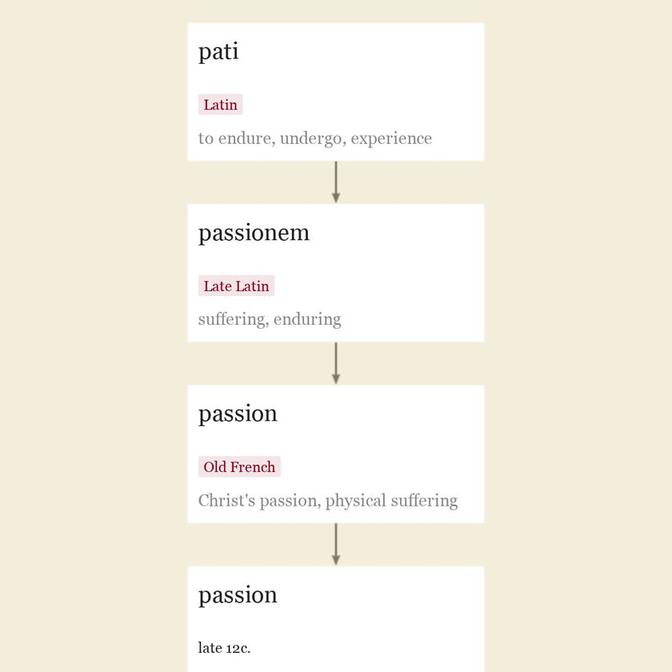passionate (adj.)
15世纪早期,“生气的; 情感的,受情感影响的,以任何意义表现或表达激情的”,源自中世纪拉丁语 passionatus “受激情影响的”,源自拉丁语 passio(属格 passionis)“遭受,忍受”(见 passion)。具体指“多情的”始见于1580年代。相关词汇: Passionately; passionateness。中古英语中也有 passional “与感情有关的”(15世纪中期,源自中世纪拉丁语 passionalis)。
passionate 的相关词汇

公元1200年左右,"基督在十字架上的受难; 基督的死亡",源自古法语 passion "基督的受难,身体上的痛苦"(10世纪),来自晚期拉丁语 passionem(主格 passio)"痛苦,忍受",源自拉丁语 pati 的过去分词词干"忍受,经历",这是一个起源不明的词。概念是"必须忍受的事物"。
这个意义在13世纪初扩展到了殉道者的痛苦,以及一般的痛苦和疼痛。它取代了古英语 þolung(用于解释拉丁语 passio),字面意思是"痛苦",来自 þolian(动词)"忍受"。在中古英语中,有时也指"受到外界事物的影响或作用的状态"(14世纪末,参见 passive)。
在中古英语中,还指"疾病,病痛,苦难",也指"情感,欲望,倾向,感觉; 将罪欲视为一种苦难"(13世纪中叶)。具体意义上的"强烈或热烈的情感或欲望"可追溯到14世纪末,源自晚期拉丁语使用 passio 来翻译希腊语 pathos "痛苦",也指"感觉,情感"。"性爱"的具体意义可追溯到16世纪80年代,但这个词曾用于任何持久的、控制性的情感(热情、悲伤、愤怒、希望、喜悦)。"强烈的喜好,热情,偏爱"的意义来自于17世纪30年代; "极受欣赏或渴望的对象"的意义则来自于1732年。
As compared with affection, the distinctive mark of passion is that it masters the mind, so that the person becomes seemingly its subject or its passive instrument, while an affection, though moving, affecting, or influencing one, still leaves him his self-control. The secondary meanings of the two words keep this difference. [Century Dictionary]
与 affection 相比, passion 的独特特点是它控制了思想,使人似乎成为它的主体或被动工具,而 affection 虽然会动摇、影响或影响一个人,但仍然保留他的自我控制。这两个词的次要意义保持了这种区别。[世纪词典]
passion-play(1843年,在德国背景下)代表了基督受难的场景。passion-flower 从17世纪30年代开始被这样称呼。
The name passionflower — flos passionis — arose from the supposed resemblance of the corona to the crown of thorns, and of the other parts of the flower to the nails, or wounds, while the five sepals and five petals were taken to symbolize the ten apostles — Peter ... and Judas ... being left out of the reckoning. [Encyclopaedia Britannica, 1885]
激情花的名字—— flos passionis ——源于花冠被认为类似于荆棘冠,而花的其他部分则被认为类似于钉子或伤口,而五个萼片和五个花瓣则被认为象征着十个使徒——彼得...和犹大...被排除在计算之外。[ Encyclopaedia Britannica,1885]
1590年代,用于描述人,“没有激情,冷静,有条理”; 1640年代,“不受激情支配,公正的”; 来自 dis- “相反的”和 passionate。相关词汇: Dispassionately。
"无激情的,冷静的",1620年代,来自 in-(1)"不" + passionate。相关词汇: Impassionately。从1590年代开始,意为"强烈受感动,被激情激起",来自意大利语 impassionato,过去分词形式,源自 impassionare(参见 impassion)。